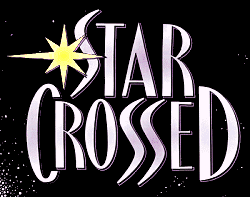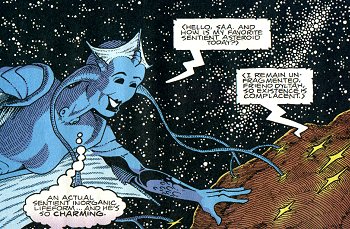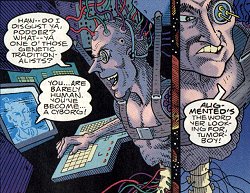Star Crossed

 OK, here’s a space story for the hard sci-fi crowd.
OK, here’s a space story for the hard sci-fi crowd.
The last two space-based comics I read were space operas: stories following the adventures of pretty-much-present-day humans in the future, with space as the setting. Not that there’s anything wrong with that… Galaxion and Wandering Star are both excellent stories I recommend reading. But there’s something especially satisfying about a story that shows off the author’s scientific homework and intensely speculative imagination whilst simultaneously using it as the springboard for a good yarn.
 In a sense, Star Crossed is space opera, as well, I suppose. It’s the story of two star-crossed lovers, a tale as old as… well ancient myths, at least. But these lovers are a human female engineered to live in the vacuum of solar space and a sentient asteroid who knows nothing of humanoids. OK, so they probably aren’t really possible. And I certainly wouldn’t go so far as to claim creator Matt Howarth’s science is (pardon the pun) rock solid. But ya gotta give points to an artist who apologises in print for drawing Jupiter too close to the asteroid belt (for visual dramatic effect), includes sound effects like “
In a sense, Star Crossed is space opera, as well, I suppose. It’s the story of two star-crossed lovers, a tale as old as… well ancient myths, at least. But these lovers are a human female engineered to live in the vacuum of solar space and a sentient asteroid who knows nothing of humanoids. OK, so they probably aren’t really possible. And I certainly wouldn’t go so far as to claim creator Matt Howarth’s science is (pardon the pun) rock solid. But ya gotta give points to an artist who apologises in print for drawing Jupiter too close to the asteroid belt (for visual dramatic effect), includes sound effects like “NO SOUND” in ship-to-ship battle scenes, and inserts some footnotes and exposition to educate the reader a little about the science that affects his story.
But back to the characters and story, which (the above blather notwithstanding) is one of the main appeals of this limited series. The chief protagonist is Dyltah, who abandoned human society entirely for a life in space. Not just living in a space ship, but actually genetically re-engineering her body to allow her to soar among the planets in the near-void of space. She’s a misanthrope, who prefers solitude… but finds herself curiously excited and drawn to Saa. Saa is not just any old hunk of interplanetary rock; he’s intelligent, possibly the last survivor of a sentient planetoid which broke up to form the asteroid belt. His thought patterns and perception of the universe are peculiar (he questions whether organic matter can be intelligent, and what it means to “move”). Their mutual curiosity leads to a great friendship, and perhaps more.
 The potentially idyllic pairing of these two is upset by the interference of the humans who live in the pod colony in orbit near Jupiter. These are mutating humans who look down on genetically engineered people like Dyltah, on the asteroid miners who are cybernetically merged with their spacecraft, and the monstrous Jovians who are adapted to living within Jupiter’s atmosphere. And the “podders” bring a connection or two to the life that Dyltah left behind and tries to pretend never existed.
The potentially idyllic pairing of these two is upset by the interference of the humans who live in the pod colony in orbit near Jupiter. These are mutating humans who look down on genetically engineered people like Dyltah, on the asteroid miners who are cybernetically merged with their spacecraft, and the monstrous Jovians who are adapted to living within Jupiter’s atmosphere. And the “podders” bring a connection or two to the life that Dyltah left behind and tries to pretend never existed.
By the end of the story, all of these parties will be involved in one way or another, as events unfold, misunderstandings happen, and mutual distrust and suspicion fester and flare up. And just as an unlikely romance between two very different individuals is a tale as old as time, so are the petty and destructive rivalries among people and the damage they cause. Howarth does a good job of recasting these classic themes in an imaginative and novel setting, with a few of his own twists thrown in that make this more than just “Romeo & Juliet In Space”.
